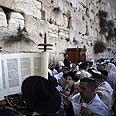
Israel 2010: 42% of Jews are secular
Central Bureau of Statistics report shows 52% of haredi men work, 88% of Israeli Jews satisfied with their lives
The Central Bureau of Statistics report published Sunday reveals that 8% of Israel's Jewish population defines itself as haredi, 12% as religious, 13% as traditional-religious, 25% as traditional and 42% as secular, on a descending scale of religiosity.
The data is from the annual general survey carried out for the CBS, which supplies information about living conditions for Israel's population. As part of the survey, some 7,500 people above the age of 20 were interviewed from throughout the country.
Among the Jewish population, the percentage of haredim is higher among younger people. In the age bracket 20-29, some 14% define themselves as haredi, compared to only 2% among those aged 65 and above. The percentage of those defining themselves as religious or traditional-religious is similar for the two age brackets. Some 38% of those aged 20-29 define themselves as secular, compared with 43% among those aged 65 and above. Among Jews, there is no outstanding difference in level of religiosity between men and women.
Most haredim work
After the debates regarding the percentage of haredim who are employed, the CBS report shows that most haredi men (52%) work. Among Jews of working age (25-54), some 93% of secular men participate in the labor force, 91% of those defining themselves as traditional, 94% of the religious, and 52% of the haredim. Some 88% of secular women of working age participate in the labor force, 80% of the traditional, 83% of the religious and 61% of the haredi women.
Among Jews, in the case of 61% of married couples, both partners work, and in the case of 28% only one partner works, usually the man (in 66% of cases). In the case of 6% of married couples, neither partner works. In the secular population, in the case of 71% of married couples both partners work, and in the case of 22% only one partner works, usually the man (75%).
Among the haredi population, in the case of 19% of married couples both partners work, and in the case of 54% only one partner works – usually the woman (60%). In about 25% of cases, neither partner works.
Among the Arab population, in the case of 20% of married couples both partners work. In the case of more than half of married couples (58%) only one partner works, usually the man (94%). In the case of 20% of married couples, neither partner works.
Fifth of secular Mizrahim
Some 60% of Jews aged 20 and above were born in Israel, and 40% abroad. Some 58% of secular and traditional, 61% of religious and 82% of haredi Jews were born in Israel.
Some 36% of secular Jews are of European or North American background (not including those arriving from former USSR countries from 1990 onwards), 23% are from the former USSR who came from 1990 onwards, 23% are at least second-generation native born, and just 19% are of Asian or African background.
Among the haredim, some 40% are at least second-generation native born, 29% of European or North American background, and 29% of Asian or African background. More than half of religious or traditional Jews (54% and 49% respectively) are of Asian or African background. Some 27% of religious and 19% of traditional are of European or North American background.
And who is most satisfied with life here? The report reveals that some 88% of Jews are satisfied with their lives: 96% of haredi, 91% of religious, 86% of traditional and 87% of secular Jews. However, only 82% of the Arab population is satisfied with their lives.
While there are restrictions on the use of internet among the haredi population, some 68% of Jewish Israelis use the internet: 80% of secular, 64% of traditional, 66% of religious and 32% of haredi Jews. Some 35% of the Arab population uses the internet.
The survey also addressed the issue of religiosity among Arabs in Israel. Some 8% define themselves as very religious, 47% as religious, 27% as not very religious and 18% as not religious. Women define themselves as religious more than men – more than half of Arab women (55%) define themselves as religious compared to 38% of men.










